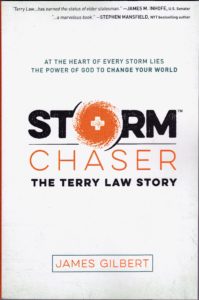As he scoured the sea of sand four miles beneath him, Terry was acutely aware that planes like this one were clay pigeons for snipers. This really is dangerous, he told himself, as if for the first time. Of course he already knew it was a hazardous mission, so the thought wasn’t new. But the feeling was. For a good twenty years it had been easier to bury his emotions, to lose them in the whirlwind of preaching engagements, plane flights, and frequent missions into various danger zones around the globe. But as perilous as his previous ministry had been, he realized now that he was just minutes from beginning the most dangerous assignment of his life, and Lyle’s words reminded him that this time it was entirely possible that he might never see his family again.
Where are they? he wondered about the snipers he had heard so much about. With only one commercial flight per day flying into Baghdad International, a private flight like his could draw attention. Then again, maybe they were lying in wait along the highway into town. Surely the General has planned for that, he reassured himself, and fast-forwarded his thoughts to the single purpose of his journey.
How in the world does an American preacher get a Muslim nation to rewrite its constitution? he asked himself for the umpteenth time. In two days he would come face to face with Iraq’s prime minister, to intercede for the people’s right to religious freedom, which, along with the lives of thousands of Christians, hung precariously in the balance. Centuries of hatred and prejudice against “Christ-followers” lay blanketed as thick and widespread as the sands below, and the slightest ill wind could stir up a storm of persecution and wholesale slaughter. Someone had to stop it from happening, to speak up now, while there was still time.
But why me? he thought. Why not some diplomat, or at least some neutral party? Why does it come down to somebody so unqualified, a guy with all the wrong credentials? Terry felt his blood drain a little; he was being scolded by his own common sense. Too late to worry about that now, Law. You’re the one who chased this storm and now you’re caught in the teeth of it, just like you were in Afghanistan. And China before that, and Russia, and….
Suddenly the old saying was true: Terry’s life really was flashing before him. Mental images of himself as a boy, splashing around in the driving rain, chasing the thunder and lightning – he had always loved the stuff that made other kids run for cover. And setting off dynamite to find water back on Ed’s ranch when he was in his early twenties; that beat Bible school any day. Then again, almost anything beat Bible school when it came to excitement. Sure, he could have taken one of the churches up on their offer and probably be safe and comfortable in a parsonage somewhere in western Canada right now. Safe, comfortable, but also completely bored and wondering: Is this all there is to my life? Is this what I was made for?
Terry smiled, then refocused, as the azure waters of Lake Habbaniya came into view, and beyond them the city of Fallujah. Ten minutes later the veteran preacher and his assistant of 30 years, Joel Vesanen, would pass over Abu Ghraib and then quickly dive – literally, he had been warned – into the firestorm that was greater Baghdad, Iraq. If there were such a thing as hell on earth in this August of 2005, Iraq’s largest city would be its furnace. In the four months since the Battle of Abu Ghraib, suicide bombers had attacked the capital with increasing frequency. Osama bin Laden and his Al Qaeda cohorts clearly did not want the country’s parliament to ratify the new constitution that had been drafted back in January. Yet it was that very document that had brought Terry here, into the mother of all storms.
He looked over at Joel, who had stood beside him so often when a more sensible man would have run. Only three years earlier the two had been nearly stoned to death by an Afghan mob, and in times past they had been known to smuggle dissidents out of some countries and Bibles into others. Once they had even sneaked bags of rice across a frozen river from China into North Korea, a crime that would have landed them in one of dictator Kim Jong Il’s labor camps.
“You might want to tighten your seatbelts gentlemen,” said the captain. The South African had been the only pilot in Amman, Jordan, willing to fly Terry and Joel to Baghdad. “We’re going into a 2G spin.”
They were almost four miles directly above the runway at Baghdad International Airport when the plane entered its intentional spiral. The pilot was performing something called a corkscrew landing, a tactic he employed for the same reasons a football player returning a kickoff weaves right and left to dodge opposition tackles. In this case, however, the shoulders of the opposing players bore missile launchers instead of padding.
Less than ten minutes later, the Beechcraft had plummeted from 20,000 feet above sea level to exactly 114, the altitude of Baghdad International’s runway. As soon as her props and wheels ceased turning, the plane’s doors flung open and Terry and Joel strode rapidly towards the terminal. The morning temperature had already reached 110 degrees, but out on the tarmac it was nearing 130, and they were as eager to escape the heat as to avoid snipers.

